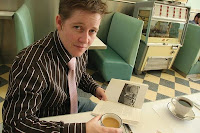
Ivan E. Coyote is a queer Canadian author and spoken word performer of butch gender who retains the pronoun "she". Coyote was first brought to my attention thanks to my feminist theory prof in fall of 2008, but I've only begun to read her recently. I thought I would start with the collection reviewed here, since it comprises short and manageable autobiographical snippets. Despite its brevity, folksiness and humour, however, the book is not what I would call "light". I don't usually get weepy-eyed over prose, and those who follow me on this site will know that I have plenty of shit to cry over, knee-deep as I usually am in Cormac McCarthy and Yukio Mishima novels. Coyote's book is an exception to my usual reading experience. Though less "literary" in certain respects, I found much of it deeply moving and had to dab the corners of the ol' eyes now and then. She hits her targets, bang-on.
Living as a gender-queer person forms the thematic core of the collection. I have a certain amount of empathy for Coyote due to my ongoing navigation of my own masculinity, but there's much here that I cannot claim to relate to because it is rooted in her own differently gendered experiences. But this is not to say that the things she talks about in her stories are utterly alien to me, or that they would be such to anyone in my gender/sexuality ballpark. Rather, the book also carries a universally human appeal in its treatment of subjects like love, sickness, aging, heartbreak, pets, the loss of loved ones, and so on. These then are the two virtues of the book, from my own vantage point: 1) As a hetero, masculine-identified biological male with my own hangups, limitations and so forth, engaging with the text is an awesome exercise in what Judith Butler calls "cultural translation", i.e. seeing how someone unique and differently gendered lives, with a view to learning, better understanding, and standing in solidarity; 2) the book is just flat-out wonderful in its humane, sparsely-delivered musings on things we all share, no matter our particulars. If Coyote's queerness is in some way constitutive of her identity as an author, then by the same token it doesn't appear thereby to shut others like me out (see in particular the story "Some of My Best Friends are Rednecks", wherein she challenges the exclusionary if not separatist attitudes of certain of her queer female readers). I feel in reading this book that I'm called by another human being to build links of understanding without thereby papering over the important differences between us. Therefore I think this is the kind of book that should be taught in middle schools and high schools across the country, unquestionably. Canada is not entirely undeserving of its claims to be relatively tolerant of difference, but it certainly has a long way to go. As Coyote reminds us, there are some out there who respond to her difference with murderous anger, and a vastly higher number still who make her feel unsafe, unwanted and uneasy in numerous subtler ways.
The sense of familiarity I've gleaned from Coyote's work can of course be partly explained in another way. She originally hails from Whitehorse, and this gives her prose a certain hard-to-pin-down Western quality. I say this because I'm a Westerner myself, and there's something about her writing that makes me profoundly homesick; to get the full extent of what I'm talking about I suggest you check her out on youtube, where she can be seen reading some of the stories in the collection with her delightful Northwestern accent. Like her queerness, I don't think Coyote's regional qualities get in the way of what she has to tell us; they form part and parcel of what she wants to tell us, while also pointing beyond themselves.
No comments:
Post a Comment
Note: Only a member of this blog may post a comment.